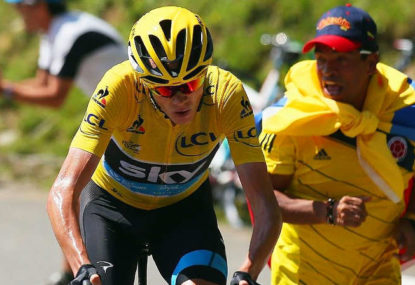'I've just won a stage of the Tour de France, mate!': Hindley grabs yellow jersey as Aussie blows Tour apart
Australia's Jai Hindley has said he is "lost for words" after a shock stage victory at the Tour de France earned him the leader's…

I am an aspiring accountant who likes to talk about professional cycling.
I have enjoyed writing stage previews for the Tour de France, so I thought I would try and branch out a bit into a more serious form of writing.
Funnily enough, my accounting experience may actually come in handy.
As part of being an accountant, there is the potential that you may need to undertake work as an auditor. The main role of an auditor is to render an opinion on whether a company’s financial statements are presented fairly.
To do so, one must use a level of professional scepticism so that all possible variables and evidence is taken into account and evaluated.
For me, the concept of professional scepticism is quite relevant when looking at the issue of doping in cycling.
We have seen over the past week, specifically on Stage 10 of this year race, Team Sky’s Chris Froome completely dominate the finishing climb of the La-Pierre-Saint-Martin. Almost as quickly as Froome road up the climb, the issue of how Froome achieved such a performance gap on his rivals started to be questioned.
Former US Postal team staffer, and one of the key protagonists in the eventual USADA report against Lance Armstrong, Emma O’Reily left the following Tweet.
The more things change, the more they stay the same!
— Emma O'Reilly (@Emma_OReilly) July 14, 2015
Her sentiments resonated in Ross Tucker, a sport scientist that is quite well known by keen observers in the cycling community.
Cycling just keeps giving gifts. Journos, I'll save you time on your reports – just dig up what you wrote in, say, 2004, and swap some names
— Ross Tucker (@Scienceofsport) July 14, 2015
The two opinions quoted above resonated with many observers of the stage. The main issue with this type of attitude is this – is it fair to call or insinuate that Froome and co are doping just because of the obvious doping history of the sport?
I will watch the tour while being sceptical (due to the sport’s past) of people like Froome, Contador etc. However, without evidence, I will not crucify anybody for doing something that is not proven, but I will invite sport scientists to study such performances to understand why they are being achieved.
This is how a cycling observer should be in my opinion. They should have an understanding of the sport’s past, and what the sport it has done to resurrect itself. They should also look at performances and question them, but not in a cynical, subjective way.
Unfortunately, due to a small fraction of the passionate cycling community not being professionally sceptical, and with the sport lacking credibility, some fans have automatically assumed certain riders, in this case, Chris Froome are doping. This has led to particular incidents over the past week that have been nothing short of utterly disrespectful and distasteful.
This is unfortunately what happens when people become subjective, and pick and choose the facts that they want to believe, and then act on them.
This tweet from sportswriter Teddy Cutler perfectly sums up what the idea of professional scepticism aims to reduce. ” There’s room for scepticism towards this Tour, as with any other. But violence and abuse towards Sky? That’s well over the boundary.”
A person can not be classed as being professionally sceptical if they use knee-jerk reactions (violence, abuse etc) to performances, without fully evaluating them.
For anybody who genuinely wants to see the sport of cycling grow and improve in terms of catching cheats, first educate yourself about how to dissect and explain the amazing performances of Chris Froome, instead of just wilfully cracking the whip with uneducated responses. This does not help anybody.
If you want examples of how this is done, refer to the work of sport scientists, including Ross Tucker and Jeroen Smart. These two people, among many others are examples of how to effectively evaluate and question performances, by looking at the variables at which these performances have been made under.
Ultimately, people are allowed to think that Froome, or anybody else is doping, but I will not take their opinion seriously if they have not yet looked at the bigger picture surrounding the performance before making a judgement. For cycling fans to better question performances of the top riders, we must first understand how the performances were attained in the first place.